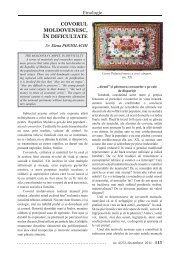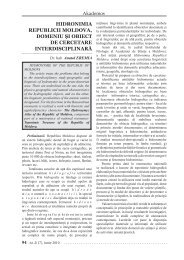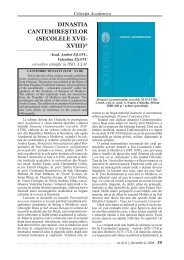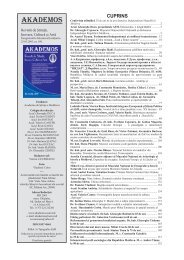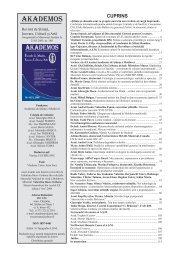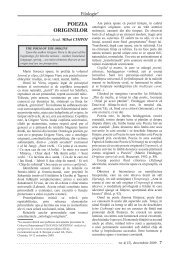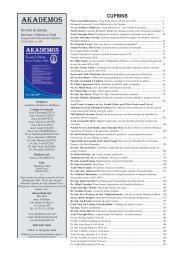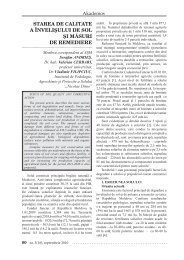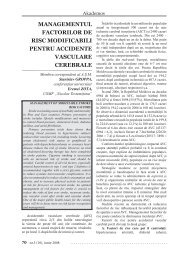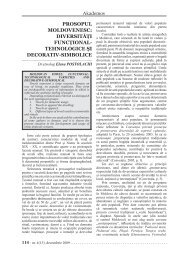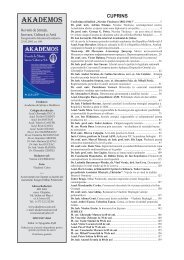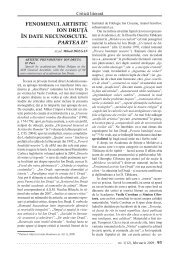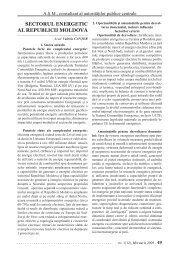Academos 3 2008.indd - Akademos - Academia de ÅtiinÅ£e a Moldovei
Academos 3 2008.indd - Akademos - Academia de ÅtiinÅ£e a Moldovei
Academos 3 2008.indd - Akademos - Academia de ÅtiinÅ£e a Moldovei
You also want an ePaper? Increase the reach of your titles
YUMPU automatically turns print PDFs into web optimized ePapers that Google loves.
<strong>Aka<strong>de</strong>mos</strong><br />
target and the probability of a firm becoming a target,<br />
the likelihood of contractual features increasing<br />
the probability of <strong>de</strong>al completion, the probability<br />
of success, the target’s premium, and the long-run<br />
performance of bid<strong>de</strong>r firms.<br />
For every lead advisor in each <strong>de</strong>al we i<strong>de</strong>ntify<br />
the stake that it holds in the target firm. This is based<br />
on the position that the advisor holds either directly<br />
or through the other financial entities – insurance<br />
firms, commercial banks, mutual funds, pension and<br />
hedge funds – that are affiliated with the financial<br />
conglomerate to which the advisor belongs.<br />
We first show that the presence of advisors<br />
helps to predict if a firm will be a takeover target.<br />
Conditioning on firms with similar industry and size<br />
characteristics, firms in which the advisors to the<br />
bid<strong>de</strong>r hold a stake are 45 percentage points more<br />
likely to become targets, with the probability of<br />
becoming a target increasing from the unconditional<br />
sample mean of 4.2% to 6.1%. Later, we build the<br />
trading strategy long in the actual positions of the<br />
advising investment banks and short in the positions<br />
of the non-advisory banks. This strategy <strong>de</strong>livers<br />
1.40% per month (adjusted for risk). This provi<strong>de</strong>s a<br />
lower bound estimate of the informational advantage<br />
that the advisory bank has with respect to other<br />
sophisticated market players.<br />
Unfortunately, it seems that the harm goes beyond<br />
the trading. It seems that the targets that investment<br />
banks selected in those <strong>de</strong>als are more expensive to<br />
begin with (by about 10%). In addition, the price<br />
that is paid in those <strong>de</strong>als is higher. If the advisor to<br />
the bid<strong>de</strong>r holds a stake in the target firm, the target’s<br />
premium increases by 590 basis points from 30.6%<br />
to 36.5% with respect to the case in which the advisor<br />
to the bid<strong>de</strong>r does not hold such a stake. An increase<br />
of one standard <strong>de</strong>viation in the (dollar value of the)<br />
average fraction of the target firm held by the advisor<br />
to the bid<strong>de</strong>r implies a premium 310 (290) basis<br />
points higher than average.<br />
Overall, these findings suggest that advisors do<br />
take advantage of their privileged position, not only<br />
by acquiring positions in the <strong>de</strong>als on which they<br />
advise, but also by directly affecting the outcome<br />
of the <strong>de</strong>al in or<strong>de</strong>r to realize higher capital gains<br />
from their positions. These results provi<strong>de</strong> important<br />
insights into the conflicts of interest affecting financial<br />
intermediaries that can both advise on corporate<br />
events and invest in the equity market.<br />
What about Sidney Weinberg shoes? Bodnaruk,<br />
Massa and Simonov did not find any positive role<br />
that investment bankers who occupy board seats play<br />
in the process. However, there is now some literature<br />
that is related to role of financial board members.<br />
Dittmann, Maug, and Schnei<strong>de</strong>r 6 from University of<br />
Mannheim analyze the role of bankers on the boards<br />
of German non-financial companies and find that<br />
banks that are represented on a firm’s board promote<br />
6<br />
Dittmann, Ingolf, Maug, Ernst G. and Schnei<strong>de</strong>r, Christoph,<br />
“Bankers on the Boards of German Firms: What They Do, What<br />
They are Worth, and Why They are (Still) There” (February 1,<br />
2008). ECGI - Finance Working Paper No. 196/2008 Available<br />
at SSRN: http://ssrn.com/abstract=1093899.<br />
their investment banking services and increase their<br />
lending to firms in the same industry. They also find<br />
evi<strong>de</strong>nce that the presence of bankers on the board<br />
causes a <strong>de</strong>cline in the valuations of non-financial<br />
firms. They also do not find convincing evi<strong>de</strong>nce for<br />
standard explanations that bankers use board seats<br />
to monitor their equity interests or their interests as<br />
len<strong>de</strong>rs, or that bankers are capital market experts<br />
and help firms to overcome financial constraints.<br />
In the United States, Guner, Malmendier, and<br />
Tate 7 find that financial experts significantly affect<br />
corporate <strong>de</strong>cisions, though not necessarily in the<br />
interest of sharehol<strong>de</strong>rs. First, when commercial<br />
bankers join boards, external funding increases. But,<br />
the increased financing affects mostly firms with<br />
good credit and poor investment opportunities. As a<br />
result, those funds tend to be wasted on inefficient<br />
projects. Second, investment bankers on the board<br />
are associated with larger bond issues, but also<br />
worse acquisitions. Third, they find little evi<strong>de</strong>nce<br />
that financial expertise matters for compensation<br />
policy or for experts without affiliation to a financial<br />
institution. The results of those two papers suggests<br />
that bankers use board representation in non-financial<br />
firms is in the interest of their banks, but not in the<br />
interest of the sharehol<strong>de</strong>rs in these firms.<br />
What are possible policy implications? Large<br />
universal banks are able to utilize the economy of<br />
scale and scope. However, they are prone to conflict of<br />
interest, especially in the area of advising, where the<br />
reliance on human capital and reputation is the largest.<br />
One might think that this would create a niche for<br />
boutique investment banks 8 . Unfortunately, we do not<br />
have the evi<strong>de</strong>nces that the advise given by in<strong>de</strong>pen<strong>de</strong>nt<br />
investment banks is no better then the advise given by<br />
universal banks (Song and Wei, 2008) 9<br />
Full service investment banks are likely to<br />
stay and are unlikely to yield market share to<br />
boutique investment banks. It is also difficult<br />
to implement better supervision procedures<br />
(stock appearance of the watch list is an<br />
important information leak by itself). Probably,<br />
full disclosure and awareness on the part of<br />
investment banks and client firms will eventually<br />
help to minimize the damage.<br />
7<br />
Guner, A. Burak, Malmendier, Ulrike and Tate, Geoffrey<br />
Alan, “Financial Expertise of Directors” (January 2006).<br />
NBER Working Paper No. W11914 Available at SSRN: http://<br />
ssrn.com/abstract=875673.<br />
8<br />
Boutiques are actively using the perception of the market<br />
place. For example, the following quote is taken from Lazard’<br />
registration Statement:“We are an in<strong>de</strong>pen<strong>de</strong>nt firm, free of<br />
many of the conflicts that can arise at larger financial institutions<br />
as a result of their varied sales, trading, un<strong>de</strong>rwriting, research<br />
and lending activities. We believe that recent instances of<br />
perceived or actual conflicts of interest, and a <strong>de</strong>sire to avoid<br />
any potential future conflicts, have increased the <strong>de</strong>mand by<br />
managements and boards of directors for trusted, unbiased<br />
advice from professionals whose main product is advice”.<br />
9<br />
Song, Weihong and Wei, Jie(Diana), “The Value of “Boutique”<br />
Financial Advisors in Mergers and Acquisitions” (February 22,<br />
2008). Available at SSRN: http://ssrn.com/abstract=1108736.<br />
30 - nr.3 (10), iunie 2008



